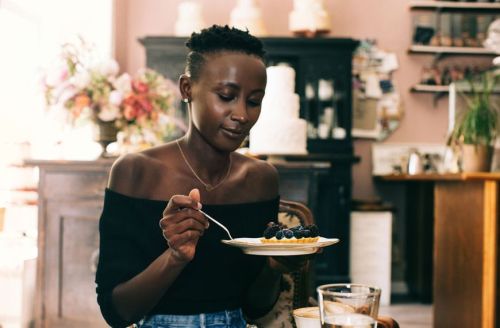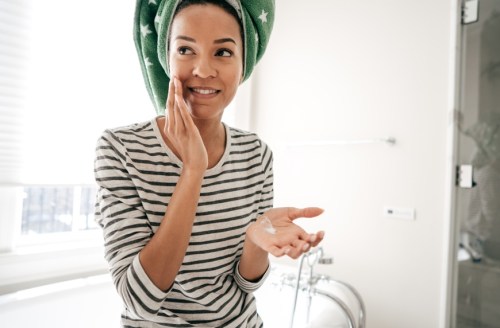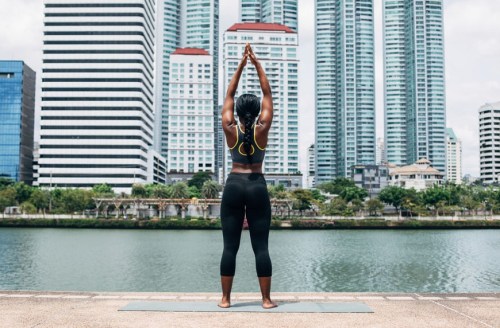A friend recently asked if I wanted to do a week-long detox with her. Her digestion was feeling sluggish after a few too many summer days of frosé and fried food, and she wanted to get back to feeling her best. It sounded totally safe, in the grand scheme of cleanses—no processed foods or alcohol for five days.
I, of course, wanted to support her. But my gut was sending me some pretty obvious smoke signals as I considered doing this detox. See, when it comes to nutrition, labels and restrictions make me anxious. They remind me of a time when disordered eating controlled my daily life.
It started in high school with an innocent intention: to simply make healthier choices. A varsity athlete, I thought I could improve my performance by swapping Doritos for slightly more nutritious study snacks. I added more whole foods to my repertoire and made a conscious effort to have protein, whole grains, fruits, and vegetables on my plate during meals. Harmless enough, right? But eventually, my focus on fueling myself better turned into an obsession. Over the next five years, I struggled intermittently with orthorexia, anorexia, and exercise addiction. A desire to be healthy became completely unhealthy.
Thanks to significant work with a therapist and nutritionist, I’ve put that chapter of my life in the rearview mirror. But I’ve also learned that even with a much healthier mentality, too much of a focus on the way I eat or move my body can send me back into an obsessive headspace. That doesn’t necessarily mean that I can’t consider myself a #wellnessjunkie anymore—I just have to be a bit more mindful about the way I approach my choices.
For me, that’s meant adopting a few mantras that I can turn to whenever I start to get neurotic about food and workouts. These philosophies have led me to a relationship with wellness that feels good for my mental health and my physical health—and I’m sharing a few of them below. (That said, I’m not a medical professional. So if my story resonates with you, I encourage you to seek one out. They’ll be able to help you find your own path to healing.)
Keep reading for the mindset shifts that helped me repair my unhealthy obsession with wellness.

I avoid restrictions and labels
Diets like Whole30 and keto receive a whole lot of love in the wellness community—and there’s no doubt that, for some, following these plans can cause major health improvements. But as someone who used to place strict rules around the way I ate, following any regimen that deems certain foods “off-limits” can trigger a spiral of unhealthy thoughts.
According to holistically-focused registered dietitians Meg Dixon and Victoria Myers, co-founders of Nourishing Minds Nutrition, I’m not alone in this feeling. “Anything that’s telling you how to eat can be a slippery slope,” says Myers.
In theory, there’s nothing wrong with labeling yourself as, say, vegan or Paleo, Dixon and Myers tell me. But things are a bit different if you’re still mending your relationship with food. In my case, my brain tends to subconsciously label certain foods or behaviors as “good” or “bad,” which then leads to intense feelings of guilt any time I don’t follow them exactly as I think I’m supposed to.
Most of the time, I eat relatively plant-based, but deciding to remove all restrictions from my diet has allowed me to feel much freer when it comes to choices I make around food. I’m more confident in tuning into what I’m craving, knowing that I don’t owe anyone an explanation for my choices—whether that’s topping my Sweetgreen salad with chicken or ordering a cone of full-fat dairy ice cream.
On the same note, Dixon and Myers encourage their clients to focus on the wellness practices that feel like a “fun addition” to their daily lives. This might be stirring adaptogens to your favorite morning latte or trying a new alt-milk in your smoothie, but the key is concentrating on the foods that you’re incorporating into your diet, rather than the ones that you’re leaving out.
“We’re bombarded by so many ideas about things we need to take away from our diets, and because of that, our inner guidance on what our body truly wants and needs is completely shut off,” says Dixon. Instead, I’ve learned that if I experiment with new foods, I’m giving my body a chance to figure out what makes me feel most energized, what tastes I truly enjoy, and what foods I feel most satisfied by.

My only “detoxes” are from social media
Have you ever felt crummy after scrolling through your social media feed? Same. I’ve even gone so far as to convince myself that I need to do a 30-day sugar detox or pay hundreds of dollars for a bootcamp in order to look like a fitness influencer. In fact, the last time I consciously scrolled through my Instagram feed, I quickly became aware that certain photos were sparking a fair amount of self-criticism—especially when they were related to food or fitness.
Those who have a history of eating disorders or exercise addiction are often more susceptible to taking wellness advice as gospel. And since social media is often riddled with ideas about what we should do in order to be healthy, this can be a dangerous combination. “Every single person has a different belief, opinion, or recommendation, and on social media, just about everyone presents themselves as a guru,” says Myers.
But we’re all our own gurus, Dixon and Myers firmly believe. While I can learn from the experiences and knowledge of others, I’ve realized it’s ultimately up to me to decide what works for me. That means hitting “unfollow” on any account that makes me feel guilty about the choices I make—even the ones categorized as #fitspo, intended to inspire us to live healthier lives. For instance, I ended up deleting a favorite fitness blogger from my feed, since I was comparing my stomach to her toned six pack and letting comparison-fueled body shame drive my workouts. “Social media should be about encouragement and support. It should never be about judging or comparing,” Myers underlines.

I realize there’s more to wellness than superfoods and spin classes
One of the biggest challenges I have when it comes to today’s wellness culture is how focused it is on food and exercise. (AKA the things that make for a double-tappable Instagram pic.) But it’s important to remember that health encompasses so much more than what’s on our plates or our Fitbit dashboards. “Stress, sleep, appropriate movement, social connection—we kind of lose sight of the other pillars of wellness, when they should really be the priority,” says Dixon.
I’ll always love a good HIIT workout and cauliflower crust pizza, but I’ve found it helpful to focus on other areas of the wellness world, too. Incorporating meditation into my life, swapping my skincare products for nontoxic alternatives, or even ditching plastic straws in favor of a sustainable one have all allowed me to take part while simultaneously respecting my own needs.

I *don’t* need to do it all
At the height of my disordered relationship with food and exercise, I was obsessed with having control over my physical appearance, which I thought translated to my “health.” What I didn’t realize at the time was how much stress that was creating in my life. “If you don’t take care of your mental health, it’s going to affect you so much more than eating a certain vegetable or doing a certain type of exercise,” says Myers.
In other words, if you’re making yourself crazy trying to fit in a meditation, a workout class, healthy meals, a face mask, oil pulling, and dry brushing, you’re likely not reaping the benefits of any of those things. “You don’t have to do all the things to be well,” Dixon emphasizes. “At the end of the day, what truly matters is your emotional health. That’s foundational.”
For some people, incorporating wellness in a non-obsessive way might look like choosing one or two practices that focus on emotional well-being, and sticking with them daily. For others, it might mean not having a specific routine at all, and instead trying out different practices whenever you feel called to do them. (Yoga on Monday, tongue scraping on Tuesday, a turmeric latte on Wednesday…)
The main takeaway for me has been that, like most things in life, wellness is not black and white. Stripping the labels and extremes—and opting instead for a few healthy habits that feel fun and soothing—has allowed me to tiptoe back into the wellness space that I once thought I’d have to say goodbye to forever. It turns out that I love white wine just as much as I love kombucha. And if, a year from now, you tell me that neither is very good for me, I probably won’t give either up. Because taking care of my emotional health is my new favorite wellness practice.
The relationship between wellness and anxiety is complicated, as one writer has experienced firsthand. For one, it actually turns out that certain types of exercise can make anxiety worse—here’s what you need to know.
Sign Up for Our Daily Newsletter
Get all the latest in wellness, trends, food, fitness, beauty, and more delivered right to your inbox.
Got it, you've been added to our email list.











